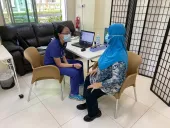
Asia hit by medical resources shortage
The changing demographics and evolving trends across Asia-Pacific mean that traditional operating models have become obsolete for healthcare providers. Focusing on cost efficient delivery of healthcare through shared responsibility across the value chain is called for, now more than ever.
According to business consulting firm Frost & Sullivan, with a significant increase in the oldage dependency ratio, especially in industrialized countries like Australia, Japan and Singapore, ageing populations have a higher demand for surgical interventions as well as ageing in place supportive care.
While these countries are seeing a transition in healthcare infrastructure towards day or ambulatory surgery as well as home healthcare, emerging markets in Asia have been slower to adopt this as healthcare is still very much treatment oriented and hospital focused.
“With increasing patient population, budget constraints and shortage of resources impacting the current medical world, Asia has not been spared and efficiency is the buzz word in the management of every hospital and delivery of healthcare services,” says the firm. Healthcare providers then face the challenge of delivering holistic healthcare management.
Breaking the status quo
The evolution and establishment of polyclinics or clinics, is both complementary to, as well as a threat to, the private hospital sector. “This is changing the way hospitals look at their operations, structure, roles, and activities as well as their key measurements. The traditional operating models are no longer relevant in today’s healthcare environment and healthcare service providers need to focus on areas where they have expertise and can create efficiency and value-based care,” says Rhenu Bhuller, Senior Vice President, Healthcare Practice, Frost & Sullivan, Asia-Pacific.
The firm urges healthcare providers and industry players to consider key trends and dynamics which are driving reform in healthcare systems across the Asia-Pacific region. “Key trends to consider in the healthcare industry include mobility and security of information, risk sharing, rebalancing of public and private sector financing and delivery of care, use of data to drive decisions as well as patient engagement,” it adds.
According to Frost & Sullivan, governments in the Asia-Pacific region are increasingly introducing populist measures and streamlining healthcare regulations. Transparency in pharmaceutical pricing is an important step towards affordable healthcare for the population.













 Advertise
Advertise













